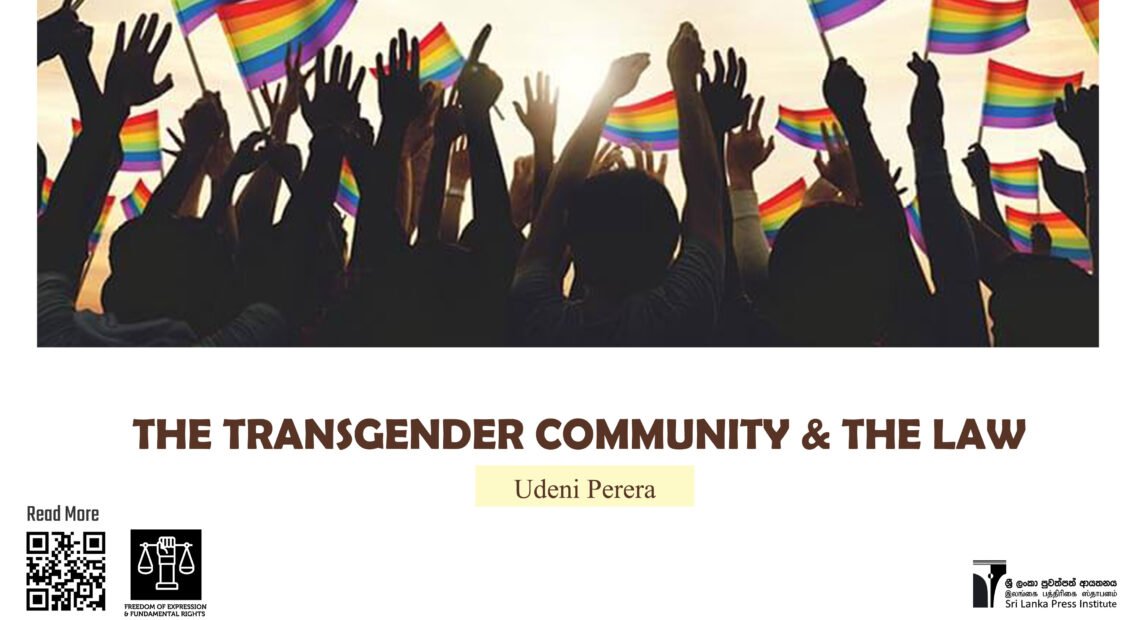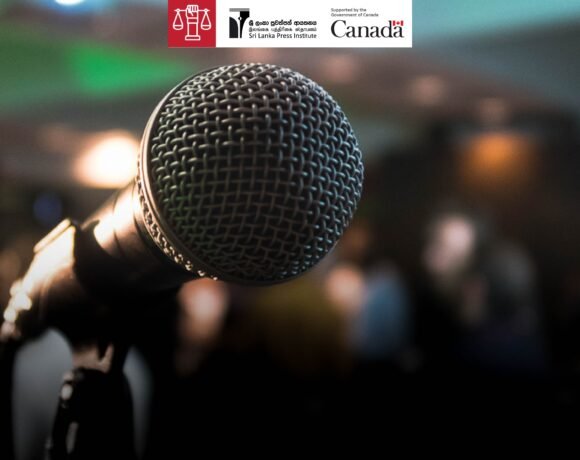
THE TRANSGENDER COMMUNITY & THE LAW
Udeni Perera
There is a wide discourse taking place about the transgender community in Sri Lankan society. Individuals and organizations that represent the transgender community often talk about the injustices they have to face. But what are the existing laws pertaining to the transgender community in the country, and are trans people really able to find relief within the framework of these legal systems?According to the United Nations Human Rights Council, the ability to express one’s sexuality is a basic human right. They also emphasize that every person should be able to live as an equal and free person without having to face violence or any form of discrimination.But the question remains as to whether the transgender community in Sri Lanka can enjoy such freedoms and equality.
The laws for transgender people are different from country to country. Some countries even allow transgender people to legally change their sex. In other countries, school systems have been put in place to help transgender people adapt to society.However, there are loopholes in these laws which are meant to protect the transgender community which results in them having to face harassment despite the laws in place when it comes to Sri Lanka.
As per Article 12 (1) of Sri Lanka’s Constitution, all citizens are equal before the law. It also states that no individual can be discriminated against on the basis of religion, language, caste, gender or political affiliation. The same article affirms equality, taking into account sexual orientation and gender, making it unconstitutional to discriminate on either basis.
Further, under Section 399 of the Penal Code, there is a possibility of arresting transgender people on the basis of disguise. In 2004, the Women’s Support Group (WSG) stated that several transgender people had been prosecuted in Sri Lankan courts on the basis of disguise and impersonation.For example, a biological male who has not undergone surgery but identifies as a woman is interpreted to be in disguise for dressing in feminine clothes.
Authorities also still have the power to detain so called ‘vagrants’ under the Vagrancy Ordinance passed in 1842. In this case, the police have the discretion and power to enforce the law which can often be seen in the misuse of this ordinance. The Women’s Support Group has stated that a misappropriation of heterosexual women, trans people and the nachchi community is due to this misuse of power. The WSG also said the ordinance was used to detain trans people at the risk of police harassment and that there were reports of such abuses happening when these arrests occur.
Also, if a transgender person wants to adopt a child, there is nothing in the legal system that allows for it.Under the current adoption law, only heterosexuals are allowed to adopt a child.
There have been instances where transgender people have been arrested merely on the suspicion of indecent exposure and sexual activity in public places. Trans people are also unable to be in public places likea bus stop without making some people feel distrustful of them. Former Human Rights Commissioner Dr. PrathibhaMahanamahewa said that when police arrest a transgender person, they immediately refer them for repetitive blood tests and that it was direct harassment of trans people.
It is legal in Sri Lanka to be a trans person or change your gender. Also the legal systems that apply to all people also apply to someone who identifies as transgender. Article 10 of the Constitution guarantees that everyone has the right to freedom of religion, beliefs and conscience. Article 11 states that no person shall be subjected to torture, harassment, cruel, inhuman or degrading treatment or punishment – and that Article 10 shall provide protection of law and order. When a trans person goes to a government to obtain the legal documents they need, the agency cannot refuse to serve that person. In such a case they can file a fundamental rights petition regarding the violation of their fundamental rights. However, there is no evidence that a petition can help change the situation.
The African continent, where the poorest nations are most prevalent, has people identifying with a number of gender identities. According to a survey on AIDS control, transwomen were noted to be at the highest risk for contracting the virus. The survey attributes this to be due to unprotected anal sex, unsafe methods of injecting hormones and silicone, and sex trafficking.
In countries like Japan, Israel, Taiwan, Thailand, South Korea, the Philippines, Nepal, Hong Kong and Mongolia, the transgender community has an open and free status. Of these, transgender communities in the Philippines have been noted to have a special place in society. In Nepal, transgender people are legally identified as ‘third gender’.
While the transgender community is not allowed such freedoms to live in Sri Lanka, they have been granted the right to live. At the same time, trans people in the country have begun to openly discuss their gender identity. For instance, BhoomiHarendran can be seen openly advocating for the trans community. The main reason for the misconceptions and misunderstanding about the transgender community in this country is the lack of accurate information about them. At present, there are many non-trans people also advocating for the transgender community. They too talk about it in public and seek to dispel misconceptions in society. As such we can see that the necessary environment is being created for trans people in the country.








